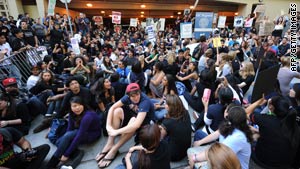As Universidades europeias têm falta de autonomia, segundo um estudo da Associação Europeia de Universidades (AEI) e que recolheu contributos de 34 conferências de reitores, incluindo de Portugal.O estudo, divulgado hoje, em Bruxelas, abrange os sistemas dos 27 Estados-membros da União Europeia (sendo que na Bélgica existem dois, o flamengo e o francófono), e ainda da Croácia, Islândia, Noruega, Sérvia, Suíça e Turquia. O documento foi dividido em quatro áreas de autonomia: organizacional, financeira, de recursos humanos e académica.
Segundo o estudo, é necessária uma maior autonomia nas Universidades europeias para estas poderem “enfrentar novas exigências”, nomeadamente a necessidade de “maior e melhor liderança e gestão” .
Outro desafio que se coloca às instituições, segundo a AEI, é a “necessidade de novos técnicos e peritos em diversas áreas”.
A autonomia financeira foi a que, segundo o estudo, se revelou mais problemática, uma vez que a maioria das conferências de reitores a considerou “um desafio actual ou fututo”.
Entre os problemas relatados, contam-se os “baixos níveis de financiamento público” e o curto-prazo dos contratos de financiamento “que torna o planeamento difícil”.
A relação com os ministros da tutela foi outro ponto sensível apontado, nomeadamente por manifesta “falta de visão a longo-prazo para o que se quer das Universidades”.
No que respeita à organização, o estudo avaliou itens como estruturas e corpos governativos, para concluir que Portugal se inclui no grupo de dez países em que as estruturas académicas e corpos dirigentes, como o reitor, obedecem a um enquadramento jurídico, enquanto na maior parte dos sistemas avaliados as instituições decidem por si mesmas. Neste campo, a academia portuguesa inclui o grupo das universidades menos autónomas.
A autonomia financeira define-se pela capacidade de angariar fundos, a forma como são captadas verbas – nomeadamente com cobrança de propinas – e a possibilidade de as instituições poderem acumular rendimentos. Portugal está no grupo que tem de devolver verbas estatais que não tenham sido utilizadas, tal como a Turquia, Chipre, Roménia, Letónia, Lituânia e Sérvia.
Ainda neste campo, se, por um lado, as Universidades portuguesas cobram propinas para gerar receitas, por outro estão impedidas de recorrer ao crédito bancário, tal como instituições de outros 11 países. Uma maioria de 22 sistemas permitem às instituições de ensino superior o recurso ao crédito bancário.
No que respeita aos recursos humanos, em 25 dos sistemas analisados (incluindo o português) os salários são estipulados pela universidade, mas na academia portuguesa há ainda funcionários públicos, situação que tem vindo a ser alterada. Na República Checa, Eslováquia e Islândia só trabalham nas Universidades funcionários públicos.
A autonomia académica é praticamente generalizada nos casos estudados, mas, na maior parte dos casos, quando as instituições organizam novos programas académicos têm que os submeter à aprovação das autoridades competentes, que os avaliam. Em Portugal, como na maior parte dos casos analisados, os critérios de admissão são estipulados pela Universidade. No entanto, o sistema de quotas regulado pelo Estado apenas vigora em mais sete países.
Em 14 países são as Universidades que estipulam o número de alunos a admitir em cada curso e noutros 12 o regime simplesmente não existe.

























